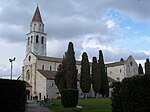Grado (Venetian: Gravo; Friulian: Grau; Slovene: Gradež; Latin: Gradus) is a town and comune (municipality) of 8,064 residents in the Regional decentralization entity of Gorizia in the north-eastern Italian region of Friuli-Venezia Giulia, located on an island and adjacent peninsula of the Adriatic Sea between Venice and Trieste. The territory of the municipality of Grado extends between the mouth of the Isonzo and the Adriatic Sea and the Grado Lagoon, and covers an area of about 90 square kilometers between Porto Buso and Fossalon. Characteristic of the lagoon is the presence of the casoni, which are simple houses with thatched roof used in the past by the fishermen of Grado, who remained in the lagoon for a long time, returning to the island of Grado only during the colder period of the year. Once mainly a fishing centre, today it is a popular tourist destination, known commonly as L'Isola del Sole ("The Island of the Sun"). It is also famous because it is a spa town; from 1873 a maritime hospice for children called Ospizio Marino wanted by the doctor Giuseppe Barellai was established on the island, because the climate and the environment of the island are a good place for the treatment of some childhood diseases. Subsequently, Grado was the chosen destination for marine thermal treatments, especially by the Austrian population. Together with Marano Lagunare, it is the centre of the Marano-Grado Lagoon, which is famous for its uncontaminated nature. Grado is the birthplace of Biagio Marin, a poet who sang about the island in the local Venetian dialect.






